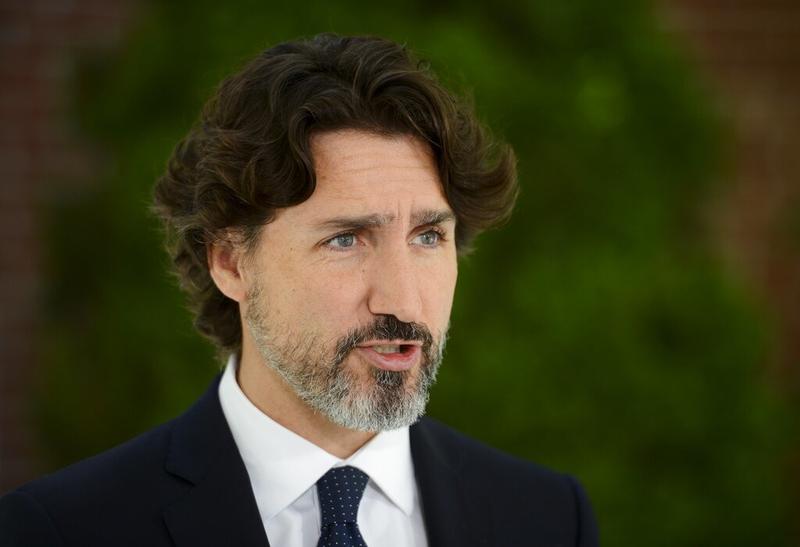 Canadian Prime Minister Justin Trudeau holds a press conference at Rideau Cottage in Ottawa on June 5, 2020. (SEAN KILPATRICK / THE CANADIAN PRESS VIA AP)
Canadian Prime Minister Justin Trudeau holds a press conference at Rideau Cottage in Ottawa on June 5, 2020. (SEAN KILPATRICK / THE CANADIAN PRESS VIA AP)
Canada has loosened its border restrictions for families separated by a temporary COVID-19 travel ban.
Immediate family members from the United States, as well as from other countries, can now enter Canada to be reunited, said Prime Minister Justin Trudeau.
"We are bringing in a limited exemption to allow immediate family members of citizens or permanent residents to come to Canada," he said on Monday.
"This is an incredibly difficult time to be apart from a spouse, a child, or mom or dad. We hear that."
This is an incredibly difficult time to be apart from a spouse, a child, or mom or dad. We hear that.
Justin Trudeau, Canadian prime minister
According to the new policy, eligible immediate family members include spouses, common-law partners, dependent children and their children, parents, and legal guardians who do not have the novel coronavirus or are showing no signs or symptoms, or who do not have reason to believe they have COVID-19.
"Anyone who enters the country will have to self-quarantine for 14 days. And if you don't follow these rules, you could face serious penalties," Trudeau said.
The immediate families of temporary residents in Canada-such as those on student or work visas-are not eligible to enter under the updated policy.
Canadian Immigration Minister Marco Mendicino clarified that the exemption applies under Canada's temporary deal with the US banning nonessential travel across the shared border, which remains open to commercial traffic and essential workers only until June 21.
ALSO READ: Canada, US extend border restrictions to control virus spread
"It's important to note that the exemption we announced today is very incremental, it's very targeted," he said.
In response to the pandemic, Canada and the US closed their border to all "nonessential" travel on March 21 for the first time since the War of 1812.
About 90 percent of the Canadian population lives within an hour's drive of the border. More than 2 million people traverse the countries' 119 border crossings each month.
Trudeau first indicated on May 29 the possible modifications by the Canada Border Services Agency to allow families in Canada and the US to reunite.
Online poll
According to The Canadian Press, an online poll that surveyed 1,523 adult Canadians over June 5-7 found that 76 percent of respondents said they expect a second wave will hit Canada. And 32 percent said they expect a second wave will be stronger than the first, with another 40 percent saying they expect it to be just as strong.
The poll also found that 51 percent of respondents said they have worn masks to go grocery shopping, up 8 percentage points in one week; and 53 percent said masks should be mandatory in public and confined spaces, like shopping malls and public transit.
READ MORE: WHO recommends wider use of face masks to curb COVID-19
Data recently released by the province of British Columbia shows that Richmond, a city with the highest concentration of Chinese residents in the province, has the lowest percentage of cases in an area where most of the province's cases reside.
The province's latest COVID-19 geographic data shows the city, in which 54.4 percent of residents have a Chinese background, has the lowest percentage of cases, with 444 per million residents, compared with 832 in Vancouver.
"Evidence is pretty clear that the Chinese community showed great leadership. Many members of the community adopted measures such as self-isolation and face masks before they were mandated," said Peter Phillips, head of the infectious diseases division of the University of British Columbia School of Medicine.


